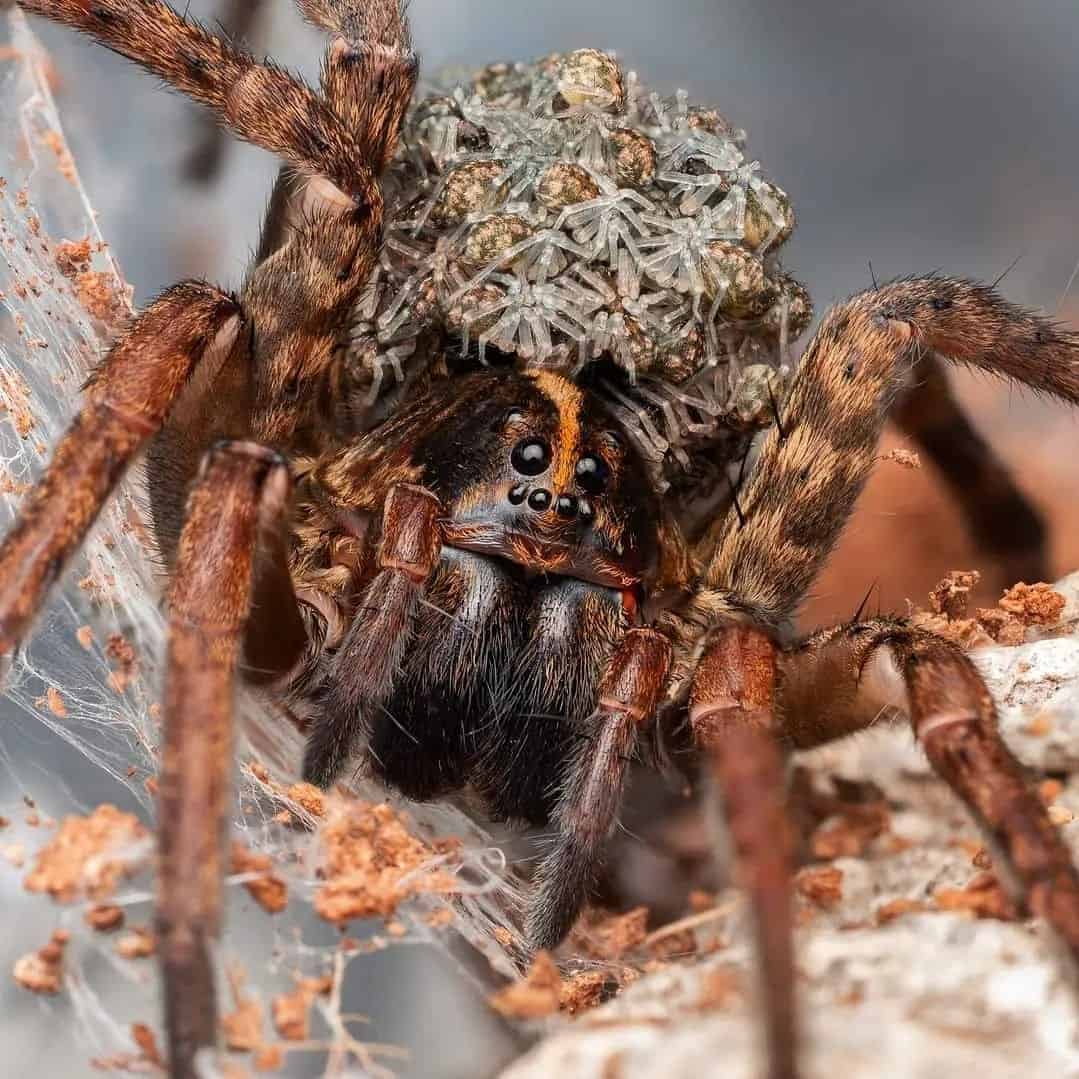Learning as much as you can about the thing you are frightened of can help you overcome your fear because knowledge really is power! It might make sense to be terrified of spiders getting into your bed, particularly wolf spiders, which can bite quite painfully.
Wolf spiders are a broad, varied species of spiders that are found all over the globe and are very adaptive and flexible. Since they are pouncing predators, they will either hunt and pounce on their victim or lurk in the shadows and wait for their opportunity to strike.
That being said, they are quite unlikely to climb up high into a bed and would instead hunt mostly on the ground. Furthermore, wolf spiders, like many other little animals, are terrified of people and will make every effort to avoid coming into touch with them.
Our goal today is to provide you with information on wolf spiders, both factual and practical. We want to help you overcome your anxiety, broaden your knowledge, and get a glimpse into the fascinating world of wolf spiders. However, if you would still rather not wake up next to a spider, we have a tutorial that will show you how to keep spiders out of your bed. Without further ado, let’s discover a little bit more about the ecology of wolf spiders.
What Are Wolf Spiders?
The majority of wolf spider species are huge and have black colors. Certain animals have marks that help them blend in with their surroundings, ward off predators, and conceal themselves from possible victims. They distinguish themselves from “regular” spiders by not using a web to pursue prey. Rather, they use their extraordinary vision and physical prowess to track down their prey.
When it comes to vision, they have excellent night vision thanks to a sophisticated, intricate array of eight eyes. Because of this, they are specialized predators of the night; in fact, their eyes shine brilliantly in the dark, much as a cat’s do!
They get their popular name from how quickly they pursue prey. While many species are specialized in pursuing prey, others prefer to sit and wait, selecting a suitable hiding place and then biding their time until a target comes into view. Their primary sources of food are other spiders and insects.
Generally speaking, women are bigger than men. The smallest species has a length of only 6.4 millimeters! Though the biggest may measure up to three centimeters.
Wolf spiders may be found in a wide variety of environments, including marshes, mountains, deserts, and grasslands. If they sense danger or need to defend themselves from predators, they will bite. In actuality, bigger creatures like lizards, birds, and some rodent species rely heavily on them as a food supply. It is quite unlikely that their bite will pose a threat to people unless they have an allergy to insect bites, even though it may be fatal for insect victims and very effective against predators. A person being bitten by a wolf spider often just experiences some redness and edema.
Behavior of Wolf Spiders
Most species of wolf spiders hunt on the ground, following their prey through leaf litter, low-lying plants, and even underground. Certain animals will use the tunnels of other creatures or dig their own subterranean passageways to hunt prey. Certain animals exhibit considerable territoriality, whilst others seem to roam aimlessly. Some animals that are territorial may dig a tunnel under a log or rock to use as a regular den.
Their high sensitivity to vibrations is another weapon in their arsenal against predators; it aids in both locating smaller prey and evading bigger ones. For this reason, if they detect vibrations originating from an enormous human presence, they will flee.
The manner in which wolf spiders nurture their young is one of their fascinating facts. Before mating, male spiders try to entice females by using their mouthparts, or palps, to drum on foliage. Similar to how we carry newborns around in a sling, females generate an egg sac after mating, which she attaches to her back (more precisely, to her spinnerets) and carries about her young while she goes about her daily activities!
The Coachella Valley Preserve
When they are mature enough, the young spiders will hatch, continue to travel on their mother’s back for a time, and then leave when they are large enough to go on independent hunts. Some animals give birth to hundreds of children at once—quite the exercise! You can learn a little bit more about wolf spiders in-depth right here.
With our increased understanding of wolf spider behaviors and feeding behavior, we are better able to respond to inquiries concerning whether or not they would crawl into beds.
Are Wolves Known to Climb Into Beds?
To get right to the chase, wolf spiders hardly seldom crawl into mattresses. Since they are often ground predators and won’t try to ascend higher, as we have previously taught, why spend energy when you don’t have to?
Their primary driving forces for movement are either to elude predators or to pursue insect prey. They will want to flee and hide from the danger as soon as they feel vibrations coming from anything as big as a person. If you know that wolf spiders exist in your area and you have seen one in your home, you may want to check your shoes, clothes, and anything else that may be left lying around on the floor that a wolf spider could crawl into. Since they typically prefer small, dark areas, a more legitimate fear might be that they would crawl into shoes or clothes left on the floor.
Even though wolf spider bites are uncommon and only occur when provoked, it’s still a good idea to avoid putting your foot through your shoe and into the face of a wolf spider. They might see this as an affront! Just in case, give your sneaker a good shake.
If your mattress is directly on the floor or if your bed is really low, these factors might make it more likely that you will encounter a wolf spider in your bed. On the other hand, wolf spiders will search for insects in your bed if they are there on a frequent basis. In this instance, remove those bugs off your bed! We will not be talking about that subject today since it is completely unrelated.
Hence, information really is power, and being aware of wolf spider tendencies might significantly allay your concern of awakening to one. It may even inspire you to see spiders differently—not than as something to be afraid of, but rather as something to be revered and fascinated by.
Even if your opinion on spiders has changed, would you still prefer not to sleep with them? Be at ease! You can avoid having wolf spiders—or any other kind of spider—climb into your bed by following a few easy measures.
How Not to Allow Spiders to Get Into Your Bed
There are a few simple techniques to keep spiders from snuggling up to you if you’re still worried about discovering one in your bed.
1. Keep Up A Proper Cleaning Schedule
If you have damp issues, clean your house seldom, leave food out, and have a lot of items scattered about on the floor, you increase the likelihood of having insects living there. Spiders follow insects! A key to keeping your home (and thus, your bed!) spider-free is to keep up a rigorous and consistent cleaning schedule that includes everything from dusting and vacuuming to mopping the floors and doing laundry.
A few thorough cleanings a year could be beneficial since they go into all the nooks and crannies that are sometimes overlooked in a routine home cleaning.
Make sure to frequently clean your linens and avoid leaving shoes and clothing on the floor of your bedroom. Eliminate any of the potential hiding places for wolf spiders, such as cramped, gloomy corners. Instead, adopt a spider’s perspective. Easy!
2. Avoid Eating in bed
It may be tempting to cook a big breakfast in bed on the weekends or to curl up with a snack there at night. When it comes to keeping insects—and therefore, spiders—away from your bed, this is an absolute no-no. Eat from a tray and take care not to drop food on the bed or nearby floor if eating in bed is an absolute must for you and one of your greatest passions.
3. Use Vinegar or Peppermint Oil to Repel Spiders
Some say that using vinegar or peppermint oil can keep spiders away. When compared to the use of toxic pesticides and insecticides that harm humans, animals, and the environment, both of these options are much better. Realizing that spiders and insects are essential to the environment and that their removal would lower the ecosystem’s overall health may also be helpful.Just something to think about!
You may use a spray bottle to dispense peppermint oil mixture along with water all over your bed. It’s definitely a good idea to mention that while using this method, you should take your flooring into consideration. The scent will be absorbed by carpets and rugs, which is okay if you like peppermint. While somewhat damp, wooden floors shouldn’t be drenched. After applying water and oil, laminate or other synthetic floors may become slick, but cleaning is simple.
Water should also be used to dilute vinegar. Because of its powerful acidity, it may be more successful in keeping those spiders away, but it also smells rather bad! Maybe it’s better to save the vinegar for dire situations only—it can interfere with your sleep and leave your room smelling pretty bad. Depending on the sort of flooring you have, the stench may linger for a considerable amount of time.
4. Make Your Bed Higher
Bed raisers may help raise your bed off the ground if you just sleep on a mattress or a very low bed. It is more unlikely that any spiders would bother to get into your bed if there is room below it. Furthermore, it could be a good idea to move your headboard away from the wall and leave a beautiful space.
5. Get Rid Of Plant Materials And Firewood
Wolf spiders may find the perfect hiding spot in any wood, including firewood or leftover construction materials, inside or outside your home. Try to remove them from the home, then. Pruning back and keeping plants away from windows and doors is a good idea for any vines and shrubs that are growing directly close to or on the home. Another excellent way to keep anything out of your property is to install window and door screens and door sweeps in areas where your doors have big gaps below them.
Managing a Wolf Spider That Climbs Into Your Bed
Alright, so you’ve done all of this, you’ve learned about the ways of the wolf spider, and who knows, maybe now you even enjoy them. However, one day a wolf spider appears out of nowhere and starts to stand on your bed. How ought one to proceed?
Avoid squashing it! 1. This is needless and harsh; 2. If it’s a female, it may be carrying kids, in which case, a) you’ll be taking many lives at once and b) it might activate the babies, turning your bed into a wolf spider nest, yikes; 3. Discolorations.
The best course of action is to quietly get out of bed, get a glass and some paper or card, and then gently remove the spider from your bed in a cool, collected manner. It is safe to leave it outdoors, and there is very little chance that it will return. You might get a painful (but not fatal) bite if you panic or act in a way that makes it feel threatened.
Final Thoughts
Therefore, the likelihood of a wolf spider crawling into your bed is quite low. Since they are ground hunters, the likelihood that they would flee and hide from a person they detect vibrations from is substantially higher.
The greatest defense against a wolf spider encounter at night is prevention: keep your home and bedroom neat and organized, and elevate your bed off the ground.
We hope this has helped you understand a little bit more about these amazing group of spiders, and even if you haven’t come to love them, you may now be able to tolerate them.




![Top 10 Birds with Long Beaks [New Edition]](https://birdsology.com/wp-content/uploads/2024/02/Silvery-Cheeked-Hornbill.jpg)

